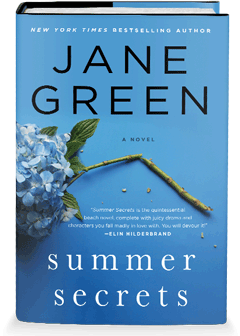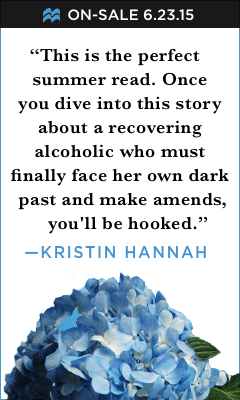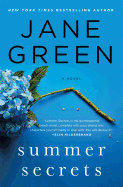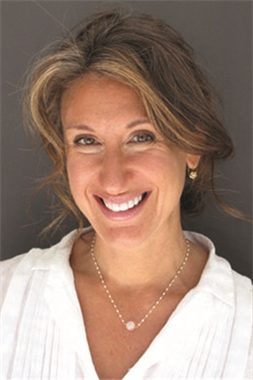Summer Secrets
by Jane Green
Jane Green has never shied away from tackling hot-button issues. Her novels have delved into the challenges and perils of extramarital affairs and divorce, mental and physical illness, families in transition, death and grief and the angst of midlife. In Summer Secrets, Green (Family Secrets; Saving Grace) peers inside the heart, mind and soul of a woman grappling with alcoholism and how that addiction pacifies and plagues every aspect of her life.
The story is told by Cat Coombs, a sophisticated and self-aware, yet deeply flawed, Brit who looks at life from two crossroads: when she was 29 and as she nears the age of 40.
In a short prologue set in 2014 London, Cat, in her late 30s, is a single mother and a struggling alcoholic. Eighteen months divorced and in the process of rebuilding her life via Alcoholics Anonymous, she is filled with regret. One night, while Cat's teenage daughter, Annie, is out with her father--whom Cat learns has a new girlfriend--she is tempted to reach for a hidden bottle of vodka--her "secret shame"--and "worship at the altar of the god to whom" she was once enslaved. This highly charged scene leaves the reader to wonder if Cat will succumb. The emotional landscape of this episode is a recurring thread in the novel, as Cat hides a multitude of alcoholic sins that chronically test her strength and willpower.
In the first chapter, she is a single, free-spirited 29-year-old, at the height of her career, working as a journalist for the Daily Gazette, a high-powered British fashion magazine. Cat loves a good time. She parties every night with co-workers and friends and drinks too much, sometimes to the point of blacking out. As she watches her contemporaries begin to settle down, she assesses her life, realizing the transformative effect alcohol has had on her since she was a teenager. "Alcohol made me beautiful in a way I never felt the rest of the time," Cat admits. "It filled me with a confidence that had always been missing."
She believes her binge drinking stems from her relationship with her father, Richard, an often demeaning and controlling man, for whom Cat could never meet expectations: "I was not the daughter he wanted."
When Richard dies, her mother, Audrey--a loyal wife who spent Cat's adolescence afraid of her husband and steeped in a deep, undiagnosed depression--shares a secret that changes Cat's life in profound and unexpected ways: Richard wasn't Cat's biological father. Her father is actually Brooks Mayhew, a charming, boozy American artist with whom Audrey had an affair one summer during a visit to the home of a beloved aunt on the island of Nantucket.
Cat wonders if her mother's unexpected revelation might be the underlying reason why she has always felt like a misfit. In an effort to dull the sting of this disclosure, Cat drinks in earnest, until one morning she wakes up, hungover, in a strange bed with a handsome man she doesn't know--Jason Halliwell, a television news director and recovering alcoholic who identified with Cat's drunken stupor the night before. "You were horribly drunk," he tells her. "You wanted to go home, but you couldn't remember where you live. I don't usually bring strange women back to my flat, but it seemed like a safer option than leaving you collapsed in a doorway...." Jason turns out to be a kind, gentlemanly savior. The two forge a bond, and Jason eventually talks her into attending her first AA meeting.
Jason's support proves the perfect impetus for Cat to dry out and turn her life around. Things seem to get even better when Audrey brokers a connection between Cat and Brooks Mayhew, who was unaware of his daughter's existence. Brooks, in turn, invites Cat to Nantucket to visit him and his daughters, Julia and Ellie, over the summer. Brooks's invitation, and learning that she has two sisters, excites Cat. But the fear of meeting the family also brings feelings of trepidation: Will she turn to drink for courage and confidence? Jason is leery about the trip, as AA frowns upon making any big life changes during the first year of sobriety. Cat--torn between disappointing Jason, yet headstrong in her ways--sets off for Nantucket anyway.
En route, she fantasizes a loving family reunion. The Nantucket house proves initially cozy and comfortable, and Brooks, the antithesis of Richard in every way, is extremely warm. Freespirited Julia soon strikes up an amicable rapport with Cat, while Ellie--married with a husband and children but "coldly polite" and immersed in Park Avenue high society--proves much harder to win over.
When Cat learns that her family is not as "perfect" as she'd envisioned, she succumbs and joins in the family pastime for over-indulging in alcohol. She drinks herself into a stupor and loses all sense of reasoning and propriety. She ultimately commits an egregious sin that shatters the place of refuge she longed to find amid her newfound family.
A beaten Cat returns to Britain. Her life, including her relationship with Jason, falls apart as the story shifts to her 10 years later--still ruing the Nantucket disaster, now a single mother, still drinking and on a path of self-destruction. When Cat is finally faced with losing everything that matters, a trip to a detox center and a 12-step program propel her to change "the things she can" in her life--including risking a return visit to Nantucket. Is Cat truly capable of confronting her past and her own glaring mistakes? Will she finally be able to reconnect with her family and mend their broken relationship?
Green has written an impassioned, harrowing drama rife with betrayals, reversals and secrets. In chilling detail, she delves into the circuitous, emotional journey of a woman who is keenly perceptive yet sadly powerless to help herself. Cat's poor decisions and her self-destructive behavior may challenge some readers' affections. However, Green's well rendered insights into Cat's flaws, imperfections and her interior alcoholic sensibility lend gritty realism that ultimately inspires empathy for Cat's character. Readers will root for Cat to do better, to live smarter, to find a way to forgive herself and make amends with those she's hurt in the hope she can move beyond the regrets of her own dark past and step into a brighter future. --Kathleen Gerard








